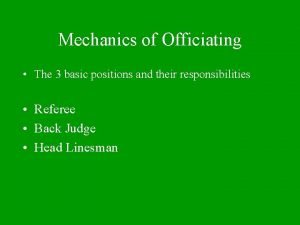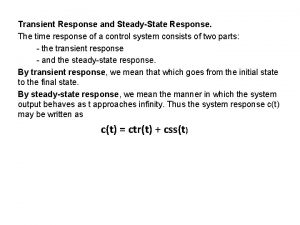Mental Aspects of Officiating Mental Aspects RESPONSE TIME





- Slides: 5

Mental Aspects of Officiating

Mental Aspects RESPONSE TIME • consistency in timing of call is most important • sudden changes in signals or timing indicate something is wrong • tendency is to establish a rhythm based on events with greatest frequency • result is a rhythm that is inappropriate for less obvious events • quick calls become questionable • slow calls are unconvincing • better officials allow the uncertain events to establish the rhythm of response • allows for greater consistency in response time

Mental Aspects OFFICIATING SLUMPS • officials can have slumps just like players • self-doubt becomes more prevalent and confidence is questionable • not easy to get up for every game • impossible to permanently avoid, best to minimize duration and severity • revitalization break or a “big game” are effective ways to break out

Mental Aspects PSYCHOLOGICAL SKILLS • Imagery-- the skill of re-creating in your mind the experiences you have had or the experiences you would like to have • having the ability to control your images to make them do what you want • imagery cannot replace conditioning and physical practice • Attributions--the need to explain why we succeed or fail to ourselves Internal-- “I have ability” or “I have put forth effort” External-- “That was a lucky call” or “My partner wasn’t very good” • Attributions are better when they are internal and the official accepts responsibility • External Attributions adversely effects self-confidence.

Mental Aspects SUCCESSFUL OFFICIATING • concentration and focus on the events that are occurring • identifying the important calls of the game and reacting accordingly • ability to anticipate the sequence of events as they are likely to occur • recognize the different potential range of events that occur at different levels • the ability to wait for everything that might happen to happen, then react • judge an event not on its occurrence, but on its relevance • allow the uncertain events to establish the rhythm of response • a certain amount of arrogance, but not overconfident • overconfidence leads to mistakes • takes away pre-game anxiety • a mild case of pre-game jitters promotes preparedness and psyches you up









